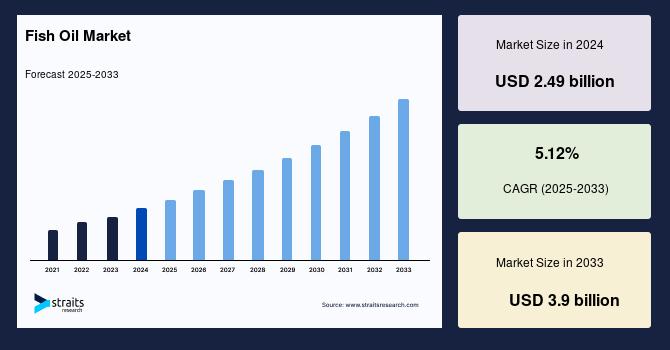Fish Oil Market Size, Share, Growth & Forecast to 2025-2033

The global fish oil market size was valued at USD 2.49 billion in 2024 and is projected to reach from USD 2.62 billion in 2025 to USD 3.9 billion by 2033, growing at a CAGR of 5.12% during the forecast period (2025-2033). This growth trajectory is fueled by increasing demand across nutraceuticals, pharmaceuticals, and the aquaculture industry, with notable regional variances in consumption and production dynamics.
Understanding Fish Oil and Its Importance
Fish oil is derived from the tissues of oily fish species such as anchovy, cod, and sardines, which are rich sources of essential omega-3 fatty acids including eicosapentaenoic acid (EPA) and docosahexaenoic acid (DHA). These fatty acids play a critical role in supporting cardiovascular health, enhancing nervous system function, and reducing inflammation. Consequently, fish oil is increasingly incorporated into dietary supplements, functional foods, animal nutrition, and pharmaceuticals. The health-conscious consumer base and growing aging population globally have led to escalating consumption of fish oil products aimed at preventing chronic diseases related to heart, brain, eye, and joint health.
Regional Insights and Market Leadership
Asia-Pacific holds a commanding lead in the global fish oil market, driven by countries like China, Japan, and India with strong aquaculture industries that heavily consume fish oil for aquafeed. In 2021, the region accounted for a market value of USD 1.16 billion and is forecasted to grow steadily at a CAGR of 5%, reaching USD 1.82 billion by 2030. The region benefits from its extensive marine resources, aquaculture technological advancements, and growing health awareness among consumers.
Challenges and Market Dynamics
Despite the positive growth outlook, the fish oil market faces significant challenges that could impact its expansion. Unpredictable environmental factors such as El Nino negatively affect fish availability by disrupting oceanic temperatures and marine ecosystems, particularly impacting prime fishing regions like Chile, Peru, and Norway. These weather anomalies result in lowered fish catch and higher production costs.
Furthermore, stringent government regulations and fishing quotas (e.g., Total Allowable Catches in the European Union) are implemented to protect marine life and promote sustainable fishing practices. While essential for ecological balance, these regulations restrict raw material availability, contributing to supply shortages and price volatility.
Manufacturers are increasingly turning to fish by-products such as heads, guts, and backbones to make fish oil, which helps mitigate supply constraints and promote resource efficiency. Currently, about 30% of fish oil production utilizes such by-products, a trend expected to grow as whole fish supply tightens.
Technological innovation in aquaculture also plays a pivotal role. Improved farming techniques (e.g., recirculating aquaculture systems, aquaponics, and offshore farming) are making fish production more sustainable and less vulnerable to environmental threats, thereby stabilizing fish oil supply chains.
Outlook and Future Trends
The fish oil market is expected to maintain moderate to strong growth through 2030, propelled by increasing consumer health consciousness, rising omega-3 awareness, and expanding aquaculture sectors. Nutraceutical companies are innovating to incorporate higher concentrations of EPA and DHA in their products, while the pharmaceutical industry continues to exploit fish oil’s therapeutic potential.
The rising elderly population worldwide, especially in regions like Japan where over 25% of people are aged 65 or above, is generating a steady demand for preventative health supplements including fish oil. Moreover, expanding use in pet foods and animal nutrition further broadens market opportunities.
Overall, the fish oil industry is navigating challenges from environmental unpredictability and regulatory controls with smart utilization of by-products and enhanced aquaculture technologies, ensuring sustainable growth and steady supply as consumer demand for omega-3 fats remains strong.
- Art
- Causes
- Crafts
- Dance
- Drinks
- Film
- Fitness
- Food
- Games
- Gardening
- Health
- Home
- Literature
- Music
- Networking
- Other
- Party
- Religion
- Shopping
- Sports
- Theater
- Wellness



